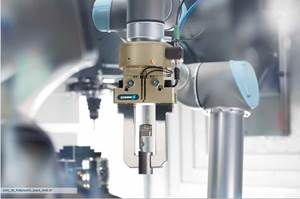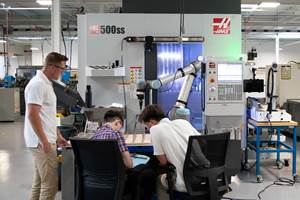VMC Increases Productivity For Machining And Forging Shop
Bourdon Forge had been using machining systems that had a number of breakdowns, limiting productivity and machining quality. Both Kerry Nowak, CNC supervisor, and Clark Bourdon, president, would not settle for just any replacement system to machine their forged alloy steel products. The machine they wanted had to be durable, tough, U.S. made, and have an attractive price.
Share


Takumi USA
Featured Content
View More

Hwacheon Machinery America, Inc.
Featured Content
View More





ECi Software Solutions, Inc.
Featured Content
View MoreBourdon Forge (Middletown, Connecticut) is a job shop that provides forgings and machines forged parts, including D-rings, snaps and other safety hardware that attach to safety belts and parachutes.
Bourdon Forge had been using machining systems that had a number of breakdowns, limiting productivity and machining quality. Both Kerry Nowak, CNC supervisor, and Clark Bourdon, president, would not settle for just any replacement system to machine their forged alloy steel products. The machine they wanted had to be durable, tough, U.S. made, and have an attractive price.
Critical analysis led the management of Bourdon Forge to purchase a Torq-Cut vertical machining center from Bridgeport Machines, Inc. (now a division of Hardinge), which satisfied all the company's requirements. Mr. Nowak initially saw the Torq-Cut and Bridgeport's FeatureMill CAM software while attending an IMTS trade show in Chicago. He performed a cost analysis on the VMC, comparing it to others of the same size, type, stature, and X-Y axis movement and Z-travel. After seeing a demonstration, Mr. Nowak and Mr. Bourdon made the decision to purchase one. The features that stood out to Mr. Nowak were the rigidity of the machine, the programming memory possible with its PC-based control and the simple programming language.
"The appeal of a single resource for both hardware and software eliminates any concerns we might have had about double sourcing," says Mr. Nowak. Regarding the rigidity of the Torq-Cut, Mr. Nowak says, "The machines have not stalled or slowed down even on heavier or difficult cuts, or when we need a great deal of power."
The rigidity has been helpful for tapping operations. Used during production runs to perform threading, drilling, countersinking and milling contours, the VMCs hold rigid tapping tolerances of +0.005 to +0.010 inch and to within +1/2 thread. The rigidity of the VMCs also provides better finish on all parts.
The power and precision the VMCs deliver come from a two-speed transmission with full 7/8-inch wide helical gears and a 9.5 peak hp AC spindle motor that can deliver 125 foot-pounds of torque—equal to a 30-hp direct-drive motor. A bi-directional 22-station tool changer accommodates No. 40 taper tooling, a feature Mr. Nowak also appreciates. "A side benefit was the fact that the machine does not require compression or expansion tooling for tapping. We can use standard tooling for our tapping needs," he says.
Depending on the particular job, Bourdon Forge saw quality increases that averaged 100 percent. Mr. Nowak attributes some of this improvement to newer fixture designs that went onto the new VMCs. The gains from this purchase resulted in the addition of two more Torq-Cut VMCs to the company.
The improvements in quality provided Bourdon the opportunity to bring into the shop a number of out-sourced jobs. "Since our own shop is able to deliver the kind of quality we want in our products, we no longer needed to out-source certain machining operations," says Mr. Nowak. Having jobs under one roof allows the company to watch more closely the quality of its products and become more competitive. Today, three Torq-Cuts run continuously 24 hours a day.
Another advantage of the Torq-Cut is its BPC-MC control. This PC-based, three-axis CNC control features an open architecture design that is compatible with previous Bridgeport CNC controls to facilitate moving programs from other Bridgeport mills without delays for reprogramming. This design also allows easy software upgrades.
The control offers a simple operator interface. Shop staff with little or no programming experience can easily follow the step-by-step screen prompts to input part processing routines and tool parameters. The control comes with 12-pre-programming milling and 24 drilling cycles from which to choose. A preview mode provides on-screen tool path verification, allowing users to view 2D or 3D graphic representations of the tool path. This ease of use, combined with the machine's rigidity, high-speed servos and better tooling, has increased overall machining productivity at Bourdon Forge by an average of 25 percent.
Bourdon Forge also purchased Bridgeport's FeatureMill off-line CAM software as part of its package. FeatureMill is an integrated geometric modeler for creating part programs. Bridgeport's feature-based approach to CAM design increases manufacturing efficiency and productivity of part-program generation. FeatureMill uses a simple programming language and on-screen icons to easily build tool paths and machining commands. The program's ability to associate between elements of customer shapes or features allows an operator to change a single value or dimension of the element, and FeatureMill will instantly update the entire model. FeatureMill also allows programs to be created off line and downloaded to the machine control, so the control is not tied up with programming.
Mr. Bourdon and Mr. Nowak had expected there to be some bugs with the Torq-Cut, considering its newness. Nevertheless, they were able to get the machine set up and running in only two days, and they are happy with the part production.
Related Content
Orthopedic Event Discusses Manufacturing Strategies
At the seminar, representatives from multiple companies discussed strategies for making orthopedic devices accurately and efficiently.
Read MoreThe Future of High Feed Milling in Modern Manufacturing
Achieve higher metal removal rates and enhanced predictability with ISCAR’s advanced high-feed milling tools — optimized for today’s competitive global market.
Read MoreLean Approach to Automated Machine Tending Delivers Quicker Paths to Success
Almost any shop can automate at least some of its production, even in low-volume, high-mix applications. The key to getting started is finding the simplest solutions that fit your requirements. It helps to work with an automation partner that understands your needs.
Read MoreCNC Machine Shop Honored for Automation, Machine Monitoring
From cobots to machine monitoring, this Top Shop honoree shows that machining technology is about more than the machine tool.
Read MoreRead Next
Setting Up the Building Blocks for a Digital Factory
Woodward Inc. spent over a year developing an API to connect machines to its digital factory. Caron Engineering’s MiConnect has cut most of this process while also granting the shop greater access to machine information.
Read MoreRegistration Now Open for the Precision Machining Technology Show (PMTS) 2025
The precision machining industry’s premier event returns to Cleveland, OH, April 1-3.
Read MoreBuilding Out a Foundation for Student Machinists
Autodesk and Haas have teamed up to produce an introductory course for students that covers the basics of CAD, CAM and CNC while providing them with a portfolio part.
Read More





































.jpg;maxWidth=300;quality=90)








